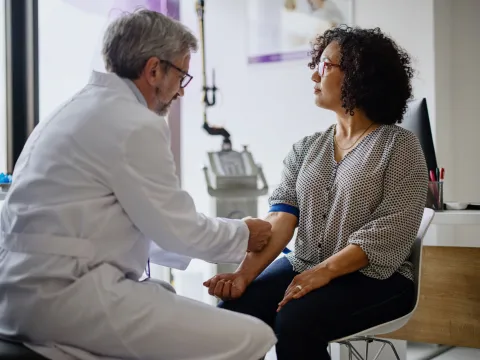- AdventHealth

Choose the health content that’s right for you, and get it delivered right in your inbox.
Hematologic cancer, commonly called blood cancer, is a serious, though often curable, form of cancer. Blood cancer is caused by genetic mutations in your blood cells, affecting your blood cells and bone marrow. Let's break down what you need to know about this common blood disease.
Types of Blood Cancer
There are three main types of blood cancer to be aware of, each having several subtypes.
Leukemia
Leukemia is the most common form of blood cancer in the United States and most frequently affects children and teenagers. People with leukemia tend to bleed and bruise easily and often experience frequent nosebleeds. In addition, you may notice small red spots on your skin and unexplained weight loss. It's also important to note that, unlike most cancers, leukemia doesn't cause visible tumors.
Leukemia can be classified as chronic (slow-growing) or acute (aggressive).
These are the primary types of leukemia:
- Acute lymphocytic leukemia is most common and grows quickly, primarily affecting children, though it can affect adults as well.
- Acute myelogenous leukemia is the most common form of aggressive leukemia, primarily affecting adults.
- Chronic lymphocytic leukemia is a common type of slow-growing leukemia that typically affects older adults.
- Chronic myelogenous leukemia is a slow-growing form of leukemia that affects adults more often than children. You may not notice any symptoms for months or even years.
Lymphoma
Lymphoma is a blood cancer that begins in the lymph node cells. The two main varieties of lymphoma are Hodgkin's lymphoma and non-Hodgkin's lymphoma, though each type has subtypes. While both Hodgkin's and non-Hodgkin's lymphoma affect the lymph nodes, the primary difference between the two is the type of lymphocyte affected. Symptoms of lymphoma often include itchy skin, swollen lymph nodes, night sweats and shortness of breath. An enlarged liver or spleen is also a sign of lymphoma to be aware of.
Hodgkin's lymphoma most often affects young adults in their 20s and 30s and is more common in women, while non-Hodgkin's lymphoma is seen more often in older adults and more frequently affects men.
Myeloma
Myeloma begins in your bone marrow and targets your plasma cells. If you have myeloma, the first symptom you will likely notice is bone pain, especially in your chest or spine. Other potential symptoms include brain fog and confusion, constipation, loss of appetite and frequent infections.
Treatment for each of these types of blood cancer can vary. Upon diagnosis, your care provider will work with you to create a personalized care plan that best suits your needs.
Remember, though these symptoms can be a sign of blood cancer, many are also frequent in other, less serious illnesses. Regardless, it's important to contact your primary care provider if you're experiencing any concerning symptoms.
Getting a Blood Cancer Diagnosis
If you're experiencing any of the symptoms listed above and suspect blood cancer may be the cause, your health care provider will likely begin with a physical examination, followed by blood work and imaging tests. Biopsies of the lymph nodes or bone marrow are also beneficial in diagnosing some types of blood cancer. Your specific testing needs will vary depending on the type of blood cancer your physician suspects.
Blood Work
A complete blood count (CBC) is a common blood test that shows a broken down, individualized cell count of your platelets, red blood cells and white blood cells. If your blood count levels are abnormally high or low, it's a sign that your body may be fighting an infection or disease, and further testing is needed.
In addition to a CBC, your provider may order a blood chemistry test. This test measures other important substances in your blood, like calcium and protein levels.
Imaging
Imaging scans can be a helpful tool to diagnose certain types of blood cancer, such as lymphoma, as they can help spot an enlarged lymph node. If your provider suspects a possible cancer diagnosis, they may order any of the following:
- Computed tomography (CT) scan
- Magnetic resonance imaging (MRI)
- Positron emission tomography (PET) scan
- X-ray
- Ultrasound
Biopsies
A biopsy is a test that collects cell samples. Depending on the type of blood cancer suspected, your doctor may recommend a bone marrow or lymph node biopsy. Testing the lymph node tissue can confirm whether a patient has lymphoma. Bone marrow biopsies are also important, as your blood cells are formed in the bone marrow. Using a small sample of bone marrow, blood and bone from either your hip bone or breastbone, pathologists can check for changes in your genetic material or abnormal cells.
Treatment Options for Blood Cancer
Blood cancer is treatable and often curable. Your health care team will work with you to create a comprehensive treatment plan that best meets your needs. Treatments will vary but may include:
- Blood transfusion
- Cancer surgery
- Chemotherapy
- Immunotherapy
- Radiation therapy
- Stem cell transplant
- Target therapies
If your blood cancer is slow-growing, your doctor may recommend waiting while monitoring with regular check-ups and blood tests before beginning any other course of treatment.
Additionally, cancer research is always evolving, and your doctor may suggest a clinical trial, depending on the status of your condition. Research studies provide the opportunity to receive the newest treatments that often aren't available outside of the trial.
Your Guide to Whole Health
Whether you're concerned about symptoms or have recently been diagnosed, you won't face cancer alone. Our cancer care specialists provide compassionate care and unwavering support, from preventive cancer screenings to diagnosis, treatment and recovery. Discover our leading-edge treatments and trusted oncologists near you and let us help navigate your journey.


